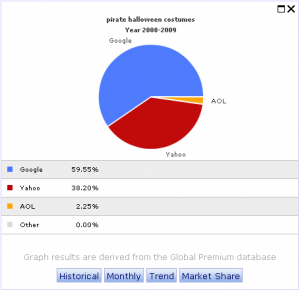Once a website is created and made available on the web there is still a vast quantity of work to be done. In order to be successful a website needs to generate targeted quality traffic, and no one is going to find the site without the right kind of marketing to direct them. The most effective way to get your website out there is to achieve the highest search engine rankings possible. The premiere factor in achieving this is to find the best keywords that work for your site.
However, it is not as simple as just choosing the most popular keywords for your market. If for example your website sells shoes, optimising specifically for the keyphrase ‘shoes’ will not necessarily reap the results intended. This keyword search does not take into account whether your site is for navigational purposes, transactional or informational. A useful tool for detecting commercial keywords is Audience Intelligence.
In fact it will be very difficult to be anywhere near competitive for this 'shoes' keyword as it is too precise and as such there will be too much competition to optimise successfully. If on the other hand a keyphrase is too targeted like; ‘red leather high-heel boots’, it will be a far less competitive keyphrase, but how many people are going to be making that search? The fact of the matter is that a lot of insight must go into the selection of keywords. As a result there are an abundance of keyword tools available. The Cozy Digital will look at a few of the front runners in keyphrase generation and determine the benefits and drawbacks of each.
1. Wordtracker
Wordtracker is one of the forerunners in keyword research tools for SEO companies. Wordtracker provide their keyword data based on known popularity of searches in relation to other statistics they acquire. One key feature of wordtracker is its method of maintaining current data. Over a surprisingly short period of time, keyphrase searches fluctuate dramatically. In order to maintain state, Wordtracker can provide data relevant to the last 48 hours of global searches. This is extremely useful as this competitive edge can make the difference in keeping keywords relevant to ever changing search trends.
The ‘brainstorming’ feature of Wordtracker is extremely powerful as it can evaluate which keywords can be of use to your site through a single provided keyword. An SEO consultant will overlook useful keywords from time to time – they are only human after all.
Wordtracker’s brainstorming feature uses this one initial keyword and scours the web for sites with matching keywords and draws other relevant keywords from their Meta tags. In addition to this it can perform a competitive analysis of the keywords you select from this list and determines not only the popularity of these terms but also how competitive they are on major search engines. This takes a lot of time and effort away from verifying the prime keywords available.
Vital to Wordtracker’s appeal, is how it caters to the professional. It is very specifically tuned to provide a variety of features which are of great use to someone keenly trained in search engine optimisation. It allows users to create multiple project files which can be related to specific sites or clients. This makes it very easy for the user to apply different search fields and keywords to different projects at different times.
In this way Wordtracker feels more like a complex application than a tool and it performs as such. This to an extent may justify the yearly costs of using it which are substantial (just over £35 a month). If used extensively it would outweigh most other keyword tools in its class as it is a finely tuned application.
2. Google Adwords: Keyword Tool
AdWords Keyword Tool is a significantly different tool from most other keyword analysers. It is an entirely free application as it was not created for the purpose of keyword analysis for search engine optimisation. This keyword tool was initially constructed as a feature to assist AdWords clients in optimising their PPC (pay-per-click) advertising. It was simply Google’s prerogative to create an external public version of this application.
Hence, it is reasonable to assume that this tool lacks the complexity and features of other keyword tools. In part this is true. It comes without the whistles and bells of other applications but the algorithm for its analysis of searches is not necessarily simpler. Having been built for use with a program for paying clients it provides a very useful and concise analysis of keyword trends. Furthermore it comes with a variety of useful features to provide insight into keyword trends throughout the year and what related keywords have recently received the highest number of searches.
The one serious drawback is that this tool was created by Google for Google and as such does not take into account the searches of other search engines like other similar applications do. Whilst Google is probably the most widely used search engine, to discount all other engines searches is seriously detrimental to this as a genuine contender for best keyword tool.
3. Keyword Discovery
A closer competitor to Wordtracker is Keyword Discovery. Like Wordtracker it runs on a monthly subscription, although the free trial of Keyword Discovery does not require your credit card details to use.
First impressions are always important and keyword discovery has a very well designed interface. It is easy to get into using it very quickly. It also offers an abundance of useful features. One of the most surprising features is the scope for expansive projects. Wordtracker allows 7 projects with a word limit of 500. Keyword Discovery lets the user create an unlimited number of projects with unlimited keywords. This is clearly a major benefit to anyone who works extensively in SEO for example.
Using the actual keyword search is very efficient and had a very useful array of options to tailor it to exactly what you need. Keyword searches can be based regionally or by search engine while also being filtered by a variety of means including phrase match, and by competitors and industry.
Once the relevant keywords have been returned they can individually be scrutinised by trends and market share. Each of these is displayed via a graph or chart based on historical and monthly searches, trends and their market share. The ease and speed by which all of this can be done is quite a nice surprise.
Another useful feature is that once keywords are selected from the list analysis can be done straight away. In Wordtracker you must wait until the end of the process to do this. Furthermore cross analysis allows comparison of keyword usage on competitor’s sites.
Overall Keyword Discovery looks and feels great, but it’s the back end of the whole system that disrupts its potential for success. There are a number of questions being asked about where they are sampling their data from and the company are somewhat tight lipped about the whole thing. KEI is also a bone of contention as its method of analysis uses all competing pages. This could be considered ineffective as it doesn’t take into account the strength of pages.
Conclusion
Between these three, it goes without saying that Adwords Keyword Tool is left for dust. While it is a useful tool it only samples from Google and simply doesn’t provide features on the scale of the other two. If it did, they would have to seriously re-evaluate there pricing. Between the big two, Keyword tracker seems aesthetically superior. Its attractive display is easy to use, provides good output and has many useful visual and project based features to match (and in some areas out do) Wordtracker. Where Wordtracker comes into its own is in the reputation it has for its sampling data.
This far outmatches the methods used by Keyword Discovery. The fact is that by having the best sampling data you are capable of providing the best keyword analysis. As such, Wordtracker is the superior option for keyphrase analysis overall, but still leaves some room for competitors to close the gap.
Cozy Digital are in no way affiliated with any of the above services and this is an independent review carried out by Cozy Digital.
- Why Invest In Content Marketing? - March 12, 2013
- Why Creative Copywriting Can Make or Break Your Brand - March 12, 2013
- What is Your Sites Link Profile Saying about You? - February 19, 2013
- Can a Small On-line Business Really Compete with the Big Boys? - February 19, 2013
- Ramsay’s Web Wire – Issue #40: Sleet, Snow and SEO - December 3, 2010
- Ramsay’s Web Wire – Issue #39: Out of the Google Frying Pan… - November 26, 2010
- Ramsay’s Web Wire – Issue #38: The Google, the Bad and the Ugly - November 19, 2010
- Ramsay’s Web Wire – Issue #37: Google Jams A Few Rockets In Your Pocket - November 5, 2010
- Ramsay’s Web Wire – Issue #36: Google Gets All Up in Your Business - October 29, 2010
- Ramsay’s Web Wire – Issue #35: Google’s Groovy Giftset - October 22, 2010
You may also be interested in:
- Google Won’t ‘Go Negative’ On New Keyword Tool Google's Keyword Tool will soon be replaced with a new system, but where are the negative keywords? ...
- Google AdWords Search-Based Keyword Tool Given its Execution Date Search-based keyword tool to be replaced ...
- Finding the Negatives in Google AdWords New Keyword Tool Google Adwords new keyword tool features enhanced filtering but seems to be lacking one evtremely useful element that is included...
- KE Why? Is the Keyphrase Effectiveness Index worth your time? There has been a lot of debate over whether or not it is worth calculating the KEI of a keyphrase. ...
- Quick Google Keyword Tool Video A very quick video about the Google Keyword Tool! Read The Full Story >>...







Dave Robinson
8 Dec, 2009
I’m not sure I agree with this – “Whilst Google is probably the most widely used search engine, to discount all other engines searches is seriously detrimental to this as a genuine contender for best keyword tool.”
At least with the Google tool you are seeing real numbers (one assumes), the others guess the Google search numbers based on extrapolated data from search engines nobody I know uses.
Just a thought
d
Total Comments by Dave Robinson: 2
Kevin Gallager
9 Dec, 2009
According to Hitwise Google had a 88.74% share of the search market in the UK in November of this year. I don’t know about you but I would not want to miss out on nearly 12% of the market. Traffic volumes can be widely inaccurate at times using the Google tool just try using the new AdWords keyword tool then use the old external one both can show radically different data.
I would say there is no one best tool for the job. What’s wrong with an old fashioned thesaurus?
Total Comments by Kevin Gallager: 24
Dave Robinson
5 Jan, 2010
I used to use Wordtracker exclusively before the AdWords tool started showing numbers. I’ve also held an annual subscription to KWD. Using Wordtracker and KWD I found keywords with sky high KEI, tons of volume and no competition. I optimised, secured the rank and got very little traffic.
This caused some concern for me and reinforced my view that ‘guessing’ search volumes based on engines hardly anybody uses was suspect.
When Google started releasing numbers the AdWords tool became a whole lot more useful, KWD even words there marketing to suggest they get real data from Google IMHO.
I agree they all have their merits but I don’t agree the Google tool is “left for dust” but that’s just my opinion
d
Total Comments by Dave Robinson: 2
John Liptrot
30 Jan, 2010
Really well put together article..thanks!
Its an age old ‘SEO’ argument that I find myself involved in or listening to regularly with my colleagues.
You can’t ignore the 12% I totally agree, Wordtracker and Keyword discovery are both great tools but can you completely trust the figures whereas the Google tool is basic but you tend to trust the results…
Total Comment by John Liptrot: 1